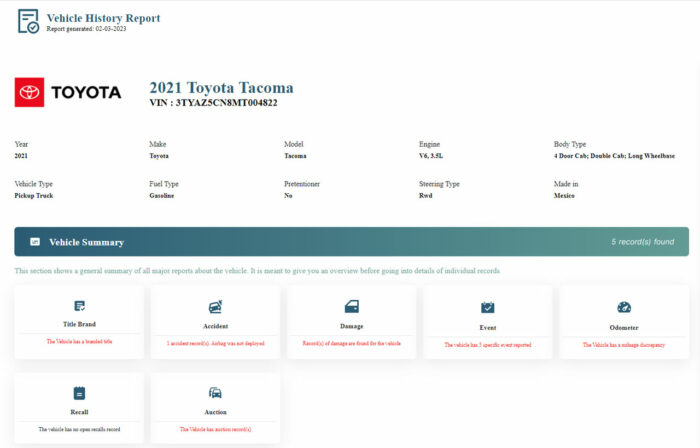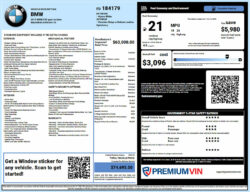A vehicle history report is a document that contains vehicle information, including accidents, damages, lien and loan records, and more. With this document, car buyers are given the opportunity to make informed decisions and get really good deals. However, scammers have begun to create vehicle history report scams targeting both car buyers and sellers. If you are selling or buying a car anytime soon, pay attention to the common vehicle history report scams that will be highlighted in this article.
Is the vehicle history report legit? Common vehicle history report scams
Vehicle history reports are supposed to protect car buyers and sellers from scams, but these scammers have found a way to carry out malicious activities under the guise of vehicle history reports. So what are the vehicle history report scams?
They are:
- Fake vehicle history report websites
- Outdated or incomplete reports
- False information
Fake Vehicle History Report Websites
Do you know that there are scam VIN check sites out there? Some of these sites are just out there to steal the user’s identity and credit card information. A good example of these scams is mostly directed at car sellers with their vehicles up for sale on online platforms. The scammers usually send messages to car sellers and engage in a discussion about the vehicle just like a normal, interested car buyer would.
However, as the conversation continues, the scammer would request a vehicle history report or a “national title report” with a link to the website you need to get the history report or title report. The national title report scam is really popular among sellers, and without prior knowledge, you just may fall victim to this vehicle history report scam. The intent of the scammer is to lure car sellers into providing their personal information and credit card details to fake websites that will overcharge for reports and have easy access to their bank accounts. Sometimes, they lure customers in with the claim of providing cheap vehicle reports and thereafter steal their information.
Here is a comment from ScamPulse:
According to several witnesses, the websites these scammers use may end with “.VIN”. This is just to trick car sellers and buyers into thinking that their services are authentic. When you notice anything of the sort, be sure to avoid them, as they are scammers.
What’s to be done? Make sure to put your car up for sale at reputable platforms such as FindUsedOnline, eBay, Craigslist, etc. Keep an eye out for vehicle history report providers that are recommended by sellers and verify their authenticity before using them. More importantly, get your vehicle history reports only from reputable sources like PremiumVIN, Detailed Vehicle History, AutoCheck, etc.
ALSO READ: How To Find Tesla Service History By VIN Number In Canada
Outdated or incomplete reports
Another form of vehicle history report scam that you should be aware of is the provision of outdated or incomplete reports during car sales. This is more prevalent among private-party sellers. There are several ways these sellers can carry out this scam.
They may deliberately hide some relevant accident or damage information from the right agencies to keep their titles clean. This way, the resale value of their cars doesn’t get reduced, and they can make more profits off unsuspecting buyers. These buyers would take a look at the report and end up getting scammed.
Another vehicle history report scam is the provision of outdated reports. There are some private-party sellers that provide vehicle history reports that are outdated and do not reflect the vehicle’s current condition to trick car buyers into scams.
What’s to be done? When a private-party seller presents the vehicle history report of the car you are interested in, ensure that you are looking at the most recent version. Make sure to verify the details contained in the vehicle history report with other reputable sources. Also, remember to carry out a proper vehicle inspection and test drive before sealing any deal and issuing payment.
Altered or false reports
It’s very funny how these scammers think, and if you’re not smart, you may fall victim to their vehicle history report scams sooner or later. With the advancement in technology, it’s no wonder some of them go as far as manually editing vehicle history reports from reputable providers to increase their vehicles’ resale value.
What’s to be done? First and foremost, ask yourself “Is the vehicle history report legit?” and “Does it look altered?” If you have any doubts, you should immediately utilize the VIN Decoder tool and VIN Check tool provided by PremiumVIN to get detailed information about the vehicle you are interested in. With this tool, you can gain access to the full vehicle history report of the vehicle and compare the specifications and history of the vehicle before making any decision. The information contained in a vehicle history report from PremiumVIN includes:
- Accident records
- Damage records
- Sales records
- Auction records with more than 10 photos
- Lien and loan records
- Accurate vehicle specifications
- Theft records
- Title brand records
- Service history
- maintenance records, and more.
Overall, guys, it’s best to be sure of what you are paying for before sealing any deal. There are scammers out there carrying out vehicle history report scams and national title report scams, and you must be cautious and prepared to spot them easily. With PremiumVIN, these scammers don’t stand a chance, so get a detailed vehicle history report today.
Frequently Asked Questions
There are several signs that someone may be trying to scam you when selling a car, including:
- The seller insists on communicating only via email or text and refuses to speak with you over the phone or in person.
- The seller claims to be selling the car for someone else and cannot meet with you or provide a test drive.
- The seller asks for payment in advance or requests that you wire money or use an unusual payment method.
- The seller offers the car at a price that is too good to be true or significantly lower than the market value.
- The seller refuses to provide the vehicle history report or other documentation related to the car’s history.
Some of the most common car-selling scams include:
- Title washing: This involves changing the title status of a car to hide its history, such as by removing the “salvage” designation.
- Odometer rollback: This involves resetting the car’s odometer to make it appear as if it has lower mileage than it actually does.
- Payment scams: This includes requesting payment in advance, asking for payment via wire transfer or other unusual methods, or providing fake payment details.
- Selling a car that has been in a flood or other type of disaster without disclosing the damage
- Selling a car with hidden mechanical problems without disclosing the issues
Yes, there are various scams that can occur when buying or selling a car. It’s important to be aware of these scams and take appropriate precautions, such as researching the car’s history with the PremiumVIN VIN check tool, conducting a thorough inspection, and only buying from reputable sellers and dealers.







